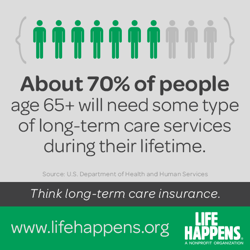Consumer Planning Blog
Never miss any update
Subscribe to the Consumer Plannig Blog newsletter today to receive updates on the latest news from our carriers.
Your privacy is important to us. We have developed a Privacy Policy that covers how we collect, use, disclose, transfer, and store your information.
Five common long-term care insurance misconceptions - debunked!
 When it comes to the subject of long-term care (LTC) insurance, there's a lot of misinformation out there. The U.S. Department of Health and Human Services (HHS) reports that 70 percent of people who reach the age of 65 will likely require long-term care at some point in their lives. So don’t let misconceptions prevent you from planning for the care you or a loved-one may need in the future. Let's separate fact from fiction. Here are five of the most common misconceptions about LTC insurance:
When it comes to the subject of long-term care (LTC) insurance, there's a lot of misinformation out there. The U.S. Department of Health and Human Services (HHS) reports that 70 percent of people who reach the age of 65 will likely require long-term care at some point in their lives. So don’t let misconceptions prevent you from planning for the care you or a loved-one may need in the future. Let's separate fact from fiction. Here are five of the most common misconceptions about LTC insurance:
- Medicare will cover my long-term care expenses.
Not likely. The amount of LTC that Medicare will cover is limited in both the amount of time and the type of situation, such as rehabilitation after an injury or illness. If care is received in a facility, Medicare may only cover your first 20 days. From day 21 to 100, you assume responsibility for a daily copayment. After day 100, Medicare does not provide any benefits, leaving the full cost to you.
- My family will take care of me if anything ever happened.
While we know that our families will come to our aid when we need it most, it's asking a lot of them to provide for our long-term care needs. Some things to consider if you plan to have loved ones care for you: Will your children or family member live nearby when care is needed? Will they be available, willing and able to perform the consistent level of care you may need for an extended period of time? Will your long-term care needs interfere with the caregiver's job or responsibilties for their own children? Being a caregiver can be time-consuming and draining, as it's both physically and emotionally exhausting.
> "America Cares, and it's Draining"
- Long-term care insurance only covers nursing homes and I would never go to a nursing home.
Today, most LTC insurance policies are considered comprehensive and allow your daily benefits to be applied to a variety of care settings, including your home, adult day care, assisted living facilities, hospice care and yes, nursing homes. What's most important is to think about your preferred lifestyle 10, 20, 30 years down the road and what type of care environment would be best suited for your preferences and needs. The majority of today's long-term insurance claims start with home care.
> "Most People Want to Stay at Home"
- I’m way too young to think about long-term care insurance.
The sooner you begin the LTCI planning process, the more options may be available to you, the lower your premiums will be and the likelihood that you will be accepted for coverage is greater. This is because long-term care insurance plans are health underwritten and insurance carriers are becoming increasingly strict on whom they accept. Generally, our health will only decrease with time, so the earlier you apply the greater the chance you'll be accepted for coverage.
> "You're Never too Young to Think About Long-Term Care"
- I can’t afford it.
Coverage may not be as costly as you might think if you get a head start. Obtaining a policy in your 40's or 50's is often considered an ideal time to obtain a lower premium, which ultimately depends on your health status and the amount of coverage selected. Discounts are also available for those with preferred health and/or couples applying together. Again, the sooner you begin planning the better because the cost of a policy increases with each birthday you celebrate.
I encourage you to take some time to begin or revisit your long-term care research with a fresh perspective. Your future self will thank you for it!

